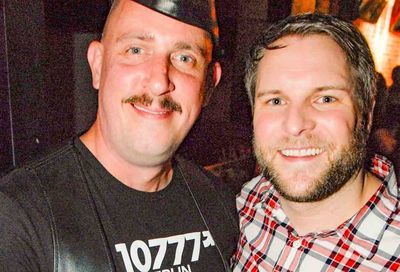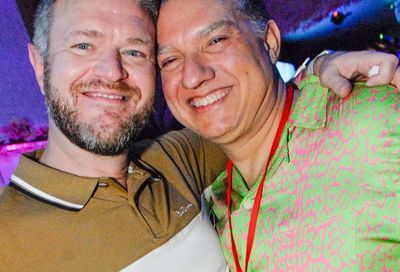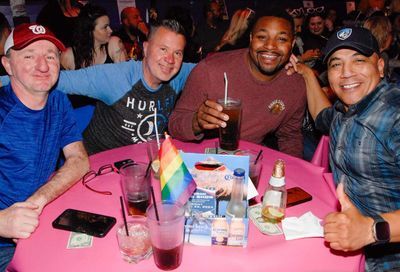The Ick Factor
Commentary: Center Field
Some gay folks just wish that my colleagues and I in the Gay and Lesbian Activists Alliance would shut up about sex. It’s not that they themselves think sex is icky, mind you. What they’re worried about are the voters who get squeamish at the thought of gay sex. Here we are in the midst of an important election year, and so much is at stake. Why do we find it necessary to talk about things like nude dance clubs and prostitution?
This attitude reminds me of the time 27 years ago when the U.S. Congress acted to block D.C.’s first legislative attempt to decriminalize sodomy as part of a comprehensive reform of sexual assault laws. Several of us had piled into Frank Kameny’s car to go to an event on Capitol Hill, and one activist started railing against San Francisco’s Sisters of Perpetual Indulgence for ”setting our movement back” with their provocative antics. (I don’t recall how they came into the conversation, but they must have done something blasphemous.)
My reaction (as someone who was taught by nuns) was that I thought Sister Boom Boom was funny and that my friend should lighten up. Beyond that, I said we might as well give up if we seriously thought that the success of the gay rights movement depended on keeping drag nuns out of sight. How exactly would we manage it, anyway — organize a squad of drag cops on roller skates to chase the drag nuns?
It always struck me as silly to pretend that we could have some sort of Gay Central issuing directives that everyone would follow. If we tried it, the person in charge of enforcement would inevitably be called Sister Mary Discipline. On a small scale, you might be able to enforce a dress code the way Kameny did for the first gay rights protest outside the White House in 1965. On any wider scale, forget it. I for one did not reject the authoritarianism of the Roman Catholic Church only to submit to some other control queens.
We in GLAA by no means focus our advocacy primarily on the sex industry. Our latest policy paper, ”Agenda: 2008,” covers such topics as police abuses, Department of Corrections discrimination against transgender detainees, health insurance, health education, marriage equality and regulatory abuse. We simply think there is room among these issues for defending adult entertainment and suggesting a more realistic approach to sex workers.
Sadly, some members of our community take the position that if they find something distasteful, no one else should be permitted to do it. For example, some gay leftists, because they dislike the military, oppose efforts to let gays serve in the military. It is one thing to oppose something as a political priority, but denying others the right to make a different choice is hardly the path toward liberation.
For me, gay rights advocacy is not merely about defending people who look like me or share my particular interests. When I gathered signatures in 1999 petitioning then-Mayor Williams to settle the discrimination and wrongful death suit filed against the city by the mother of the late Tyra Hunter, my spirit felt bound to Tyra’s by the cause of justice, aside from our differences of color and gender identity. When I defend the right of adults to choose their own entertainment, it is not because I care much for strip clubs (the dancers tend to be too young for my taste), but because it offends me that bluenoses and busybodies should be able to impose their sensibilities on the rest of the population in a cosmopolitan city.
If we seek equality, we should embrace it ourselves. One way of doing that is to stop kowtowing to the double standard whereby straight sex is taken for granted to the point of being ubiquitous, while the slightest hint of gay sex is considered scandalous. As a civil libertarian, I also defend the right of adults to make their own choices without moralistic government intrusion. Sex is only one part of me, to be sure. But I’ll be damned if I’ll accept that there is anything wrong with it, or that forgetting what brought me to town in the first place will somehow make the struggle for our rights easier. In that case, what is the struggle for?
Richard J. Rosendall is a writer and activist whose work has appeared on Salon.com and the Independent Gay Forum (www.indegayforum.org). He can be reached at rrosendall@starpower.net.
Support Metro Weekly’s Journalism
These are challenging times for news organizations. And yet it’s crucial we stay active and provide vital resources and information to both our local readers and the world. So won’t you please take a moment and consider supporting Metro Weekly with a membership? For as little as $5 a month, you can help ensure Metro Weekly magazine and MetroWeekly.com remain free, viable resources as we provide the best, most diverse, culturally-resonant LGBTQ coverage in both the D.C. region and around the world. Memberships come with exclusive perks and discounts, your own personal digital delivery of each week’s magazine (and an archive), access to our Member's Lounge when it launches this fall, and exclusive members-only items like Metro Weekly Membership Mugs and Tote Bags! Check out all our membership levels here and please join us today!


















